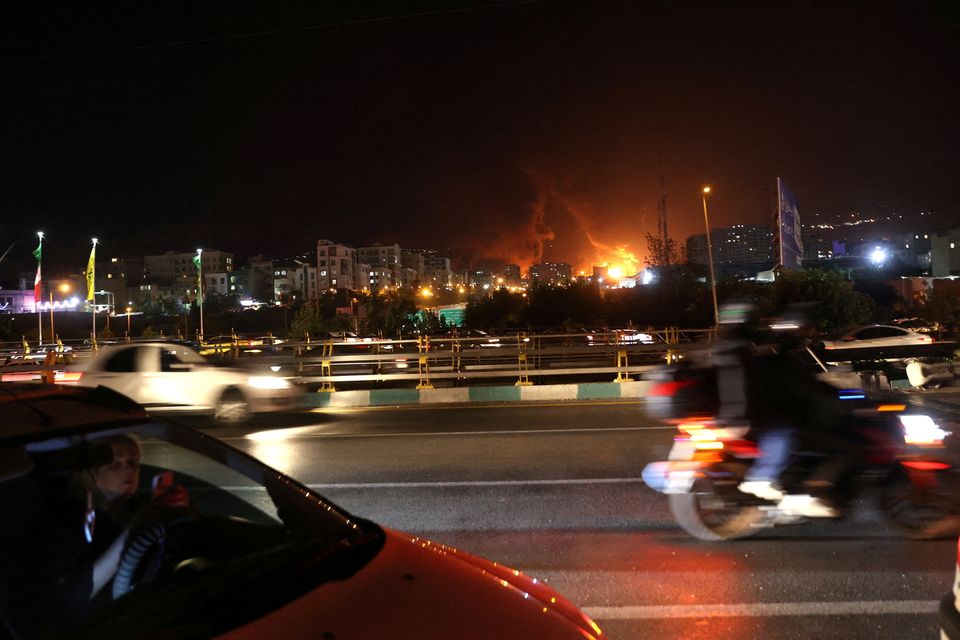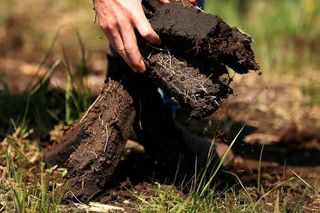Letters: $200m wasted each day by Israel on missile attacks, all the while global poverty persists
An explosion after an Israeli missile attack on the Sharan Oil depot in Iran. Photo: Reuters
It is estimated that the cost to Israel to date of defending against Iranian missile attacks is around $200m (€174m) a day. Israel is prepared to spend further billions in an unnecessary war with Iran.
Between the Russian-Ukraine and the Gaza wars, the cost must now be astronomical.
The human cost in these wars is either incalculable, or is of no concern to the warmongers.
It is hard to imagine that it is easy to procure money for war, yet so difficult to procure money for food and health in impoverished nations – funding that would provide a greater chance of a peaceful world.
The silence of world leaders is deafening on this massive disparity. The question is: Do financial benefits for some obviate the death and suffering that munitions inflict upon human beings?
Declan Foley, Melbourne, Australia
Excuses for war on Iran are not merited and evoke echoes of Iraq invasion
Israel has been claiming for many years that Iran is close to building a nuclear bomb. The evidence for this is far from clear-cut. In fact, Benjamin Netanyahu’s pretext for war increasingly resembles the infamous “weapons of mass destruction” allegation used to justify the US invasion of Iraq.
However, it is widely acknowledged, but often left unsaid, that Israel itself has a considerable stockpile of nuclear weapons. Estimates suggest it has more than 90 nuclear warheads. Who knows the actual number? The Israeli state has never signed the Treaty on the Non-Proliferation of Nuclear Weapons.
Iran is controlled by a vicious, oppressive regime, but the suggestion from the US and others that Israel is on the side of the angels in this conflict is plainly ludicrous.
Fintan Lane, Lucan, Co Dublin
Here’s hoping if Ayatollah Khamenei is overthrown a president will be elected
Whether the Islamic Republic of Iran survives under the leadership of supreme leader Ayatollah Ali Khamenei or another clerical figure, Iran certainly doesn’t need a return of the Pahlavi dynasty that ruled the nation between 1925 and 1979.
Iran’s last shah was a despot whose 1941 to 1979 rule was enforced by his notorious secret police, Savak, from 1953 until he was overthrown.
Exiled crown prince Reza Pahlavi has no place on the Peacock Throne.
If change does occur in Iran, hopefully a democratically elected president will be the choice of the people.
Finally, it would be in the Middle East’s best interests if Benjamin Netanyahu could submit himself to the International Criminal Court for alleged crimes against humanity committed against the innocent Palestinian people.
Dominic Shelmerdine, London
Starmer stoops too low for Trump as American ideals drift away from Europe
Frank Coughlan rightly bristles at the image of Keir Starmer stooping to gather Donald Trump’s dropped papers – a moment of awkward courtesy that risks becoming a metaphor for European diplomacy (‘Europe should neither bow nor bend to bully boy Trump’, June 20).
But beneath the theatre lies a deeper truth: the post-World War II order where Europe leaned on American strength while lecturing it on restraint is in terminal decline.
America’s global leadership is no longer anchored in shared ideals, but in transactional nationalism. Trump embodies this shift, but it won’t end with him. The next era of geopolitics will be defined not by Atlantic unity, but by cold, conditional alliances based on cost-benefit calculation.
I suspect that by 2030 we’ll see a Europe that either relearns strategic autonomy – investing in its own defence, industrial capacity and global leverage – or one that fragments into spheres of influence too dependent to push back, too divided to act.
The choice will have been made not at summits, but in the small moments when leaders kneel instead of standing.
Enda Cullen, Tullysaran Road, Armagh
If the willpower is there, infrastructure logjams in the State can be cleared
This week, senator Michael McDowell urged the Government to replicate a piece of legislation from 1925 that the fledgling Free State government enacted to build the massive Ardnacrusha electricity station on the Shannon.
It covered the state financing of the project, the CPO-ing of land, construction of canals and so forth.
This is the way, he suggested, to overcome the administrative sclerosis blocking the construction of the north Dublin sewage treatment plant, the piping of water from the Shannon to Dublin, talked about for nearly 30 years, the building of vitally needed onshore and offshore wind-energy farms, as well as key road and rail projects.
Meanwhile, every government member, from the Taoiseach down, and the heads of the various state infrastructural agencies (EirGrid, ESB, Uisce Éireann, transport agencies) acknowledge the dire consequences of not resolving these logjams, and the fact that the existing permitting systems are not for purpose.
Last month, the Government launched its new Accelerating Infrastructure Taskforce to underline this fact.
But this will be little more than the latest episode of “kicking the can down the road” unless the Government undertakes the kind of bold legislative initiative urged by Mr McDowell. So, could it happen? Well, this week the Government was able to draft, pass and have enacted a bill extending Rent Pressure Zones to the whole country.
Where there’s a will, there’s a way.
Stephen O’Byrnes, Dublin 4
Spare a thought – and some water – for wildlife during this hot weather
It’s hot out there, so please remember a dish of fresh water for the birds, and if you’re lucky enough to have them, a dish of fresh water for the hedgehogs as well.
Eve Parnell, Dublin 2
Be careful with your words as they can do harm and have dark consequences
Our workplaces, schools and homes are filled with hurtful words.
Words are powerful weapons and can be used in the most hurtful way to harm another person and trigger a journey on a downward spiral. We need to think before we speak. Let’s use words to be kind to one another.
Brian McDevitt, Glenties, Donegal
Join the Irish Independent WhatsApp channel
Stay up to date with all the latest news








.jpg)






